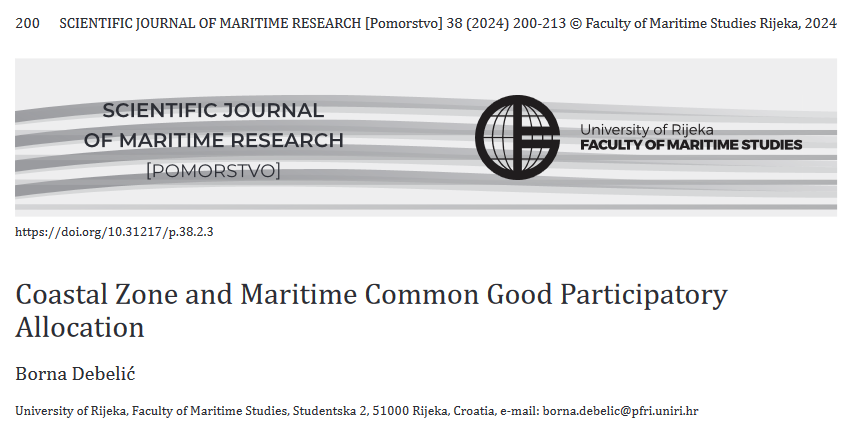Coastal Zone and Maritime Common Good Participatory Allocation
Keywords:
maritime common good, allocation, commons, participation, institutions, sustainability, maritime domain, coastal zone, governance, stakeholdersAbstract
The paper presents results of the research focused on analysing applicable allocation approaches (general mechanisms) regarding coastal zones and maritime common good. We identified relevant general stakeholder groups and two general allocation approaches, one with decision-making authority granted exclusive to public authorities, and other – participatory approach – based on self-governing and deliberative inclusion and proactive participation of all relevant stakeholders in the allocation decision-making process and governing mechanism. The research also utilises application of agency theory to maritime common good and coastal zone allocation, evaluating identified allocation approaches in the light of the agency theory. The research also encompasses an in-depth literature analysis, complementary accompanying previous research in the field and evaluating compatibility of participatory allocation approach with modern institutional framework addressing coastal zone management in the Mediterranean. The importance of further developments of maritime common good and coastal zone allocation approaches and mechanisms, based on active participation and partnership of stakeholders in the decision-making process, is emphasized in order to further strengthen the potential for stronger and fruitful utilisation of information background (local knowledge) from local population necessary to sustainably improve complex allocation process of maritime common good on the long run.

Downloads
Published
Issue
Section
License
Copyright (c) 2024 Borna Debelić

This work is licensed under a Creative Commons Attribution-NonCommercial-NoDerivatives 4.0 International License.
Scientific Journal of Maritime Research understands the need for authors to disseminate and maximize the impact of their research. When submitting an article for publishing in Scientific Journal of Maritime Research, it implies that the Corresponding Author transfers, with the consent of all Coauthors, the copyright ownership in the referenced submission, including all versions in any format now known or hereafter developed, to the Scientific Journal of Maritime Research.
Copyright protects your original work and research material and prevents others from using it without your permission. Others will be required to credit you and your work properly, thus increasing its impact. Should your submission be rejected or withdrawn prior to acceptance for publication by Scientific Journal of Maritime Research, this transfer will be null and void.
Authors, users or readers of an article need clear instructions on how they can use the article. Scientific Journal of Maritime Research uses the Creative Commons Attribution-NonCommercial-NoDerivatives (CC-BY-NC-ND) 4.0 International License, which governs the use, publishing and distribution of articles by authors, publishers and the wider general public.
The authors are allowed to post a digital file of the published article, or the link to the published article (Scientific Journal of Maritime Research web page) may be made publicly available on websites or repositories, such as the Author’s personal website, preprint servers, university networks or primary employer’s institutional websites, third party institutional or subject-based repositories, and conference websites that feature presentations by the Author(s) based on the published article, under the condition that the article is posted in its unaltered Scientific Journal of Maritime Research form, exclusively for non-commercial purposes.




